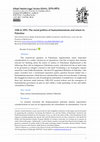Journal Articles and Book Chapters by Shaira Vadasaria

Gaza on Screen, 2023
Gaza on Screen (ed. Nadia Yacoub, Duke University Press 2023)
Book Abstract:
Gaza’s long a... more Gaza on Screen (ed. Nadia Yacoub, Duke University Press 2023)
Book Abstract:
Gaza’s long association with resistance and humanitarian need has generated a complex and ever shifting range of visual material, comprising not just news reports and documentaries, but also essay, experimental, and fiction films, militant videos, and solidarity images. Contributors to Gaza on Screen, who include scholars and Gazan filmmakers, explore the practice, production, and impact of film and videos from and about the Gaza Strip. Conceptualizing screens—both large and small—as tools for mediation that are laden with power, the volume explores Gazan film and video in relation to humanitarianism and human rights, care, community, environment, mobility and confinement, and decolonization. The volume includes visual material ranging from solidarity broadcasts on Lebanese television, mid-twentieth-century British Pathé newsreels, and fiction films to breaking news, visuals of contemporary militant resistance, documentaries, and found footage films, arguing for a visual ecosystem in which differing types of film and video affect and inform each other. Throughout, Gaza on Screen demonstrates that screens shape and sustain relationships between Gaza and the world, and help to sustain the possibility of a different future.
Race and Colonialism in Socio legal Studies in Canada, 2023
Murdocca, Vadasaria, Bryan (2023). "Race and Colonialism in Socio legal Studies in Canada" in Vio... more Murdocca, Vadasaria, Bryan (2023). "Race and Colonialism in Socio legal Studies in Canada" in Violence, Imagination, and Resistance:
Socio-legal Interrogations of Power, edited by Mariful Alam, Patrick Dwyer, and Katrin Roots, Athabasca University Press, 35-57.

1948 to 1951: The racial politics of humanitarianism and return in Palestine, 2020
The unresolved question of Palestinian displacement raises important considerations in a settler ... more The unresolved question of Palestinian displacement raises important considerations in a settler colonial era of reparations. One line of inquiry that remains relevant for thinking about the future of redress to Palestinian displacement is the following: How did an Indigenous Palestinian society with historical ties to land come to be governed as refugees external to the land? Examining a set of progress reports issued by Count Folke Bernadotte - the first UN appointed Mediator on Palestine - this paper considers how a land-based reparative justice question became folded into a humanitarian structure, which has now stretched the course of seven decades. Centering the struggle for return as a site of ontological contestation, I consider how we might read these key decisions made between 1948-1951 around redress and the emergence of humanitarian governance as part of, and within a wider genealogy of race and settler colonialism in Palestine.

Critical Studies on Security, 2016
Abstract: Bringing a critical race analysis to existing literature on securitization, this articl... more Abstract: Bringing a critical race analysis to existing literature on securitization, this article addresses a lacuna in securitization theory and offers a conceptual framework to account for the entanglements between the securitization of immigration and racial violence. First, we consider the limits of the concept of securitization to account for the normality of racial violence, and argue that responses to events deemed to be “crises” need to be analyzed in relation to the juridico-political orderings of power formed under colonial modernity, of which race is a central organizing principle. Second, we discuss the framework of racial governmentality and suggest that securitization enables expressions of racial desires already constitutive of colonial modernity. Thus re-embedded in liberalism’s racial story, these processes of securitization can be analyzed not as operating an exceptional rupture with normal liberal politics, but as enabling a lift on the prohibition of liberal intolerance that produces what we call uninhibited violence. Third, we present a brief empirical vignette of a case of securitization of immigration in Canada to illustrate our argument.

Social Identities, 2015
This paper examines the construction of the Simon Wiesenthal Center ‘Museum of Tolerance (Jerusal... more This paper examines the construction of the Simon Wiesenthal Center ‘Museum of Tolerance (Jerusalem)’ over Mamilla Cemetery, one of the largest Muslim burial grounds in the region. Tracing the politics of death as exercised through the excavation of the cemetery, I consider how access to settler colonial memory is managed and renewed through the purging of Indigenous corporeality. Inspired by Achille Mbembe’s sobering account of necropower, this paper conceptualizes power as a system of domination inscribed through the colonial management of deceased racial subjects and asks how we might understand systems of settler colonial power arranged through dehumanization of the already dead. I contend that the capacity to govern life after death is still firmly rooted in the reach of colonial power, and that by attending to the excavation and erasure of Mamilla Cemetery’s deceased Palestinian subjects, we see a particular configuration of sovereignty defined through a calculus of absence. Identifying this practice of settler colonial nation building as ‘necronationalism’, I consider how power over life after death becomes the very terrain through which a nation is imagined.
At the Limits of Justice: Women of Colour on Terror , 2014
This is a short introduction to the second section of the book, At the Limits of Justice: Women o... more This is a short introduction to the second section of the book, At the Limits of Justice: Women of Colour on Terror (2014, University of Toronto Press), edited by Suvendrini Perera and Sherene H. Razack
Anti-Colonial Poetics: A Methodology from and for Palestine, 2013
Papers by Shaira Vadasaria
University of Toronto Press, Sep 1, 2014
This is a short introduction to the second section of the book, At the Limits of Justice: Women o... more This is a short introduction to the second section of the book, At the Limits of Justice: Women of Colour on Terror (2014, University of Toronto Press), edited by Suvendrini Perera and Sherene H. Razack
Duke University Press eBooks, Aug 2, 2023
Retrosopect Journal, Race in Retrospect, 2021
The article explores Arthur James Balfour's legacy at the University of Edinburgh as imperial sta... more The article explores Arthur James Balfour's legacy at the University of Edinburgh as imperial statesman and Chancellor of the university in the period 1891-1930. It examines Balfour's contribution to the constitution of a racialised global order during his mandate at Edinburgh.











Uploads
Journal Articles and Book Chapters by Shaira Vadasaria
Book Abstract:
Gaza’s long association with resistance and humanitarian need has generated a complex and ever shifting range of visual material, comprising not just news reports and documentaries, but also essay, experimental, and fiction films, militant videos, and solidarity images. Contributors to Gaza on Screen, who include scholars and Gazan filmmakers, explore the practice, production, and impact of film and videos from and about the Gaza Strip. Conceptualizing screens—both large and small—as tools for mediation that are laden with power, the volume explores Gazan film and video in relation to humanitarianism and human rights, care, community, environment, mobility and confinement, and decolonization. The volume includes visual material ranging from solidarity broadcasts on Lebanese television, mid-twentieth-century British Pathé newsreels, and fiction films to breaking news, visuals of contemporary militant resistance, documentaries, and found footage films, arguing for a visual ecosystem in which differing types of film and video affect and inform each other. Throughout, Gaza on Screen demonstrates that screens shape and sustain relationships between Gaza and the world, and help to sustain the possibility of a different future.
Socio-legal Interrogations of Power, edited by Mariful Alam, Patrick Dwyer, and Katrin Roots, Athabasca University Press, 35-57.
Papers by Shaira Vadasaria
Book Abstract:
Gaza’s long association with resistance and humanitarian need has generated a complex and ever shifting range of visual material, comprising not just news reports and documentaries, but also essay, experimental, and fiction films, militant videos, and solidarity images. Contributors to Gaza on Screen, who include scholars and Gazan filmmakers, explore the practice, production, and impact of film and videos from and about the Gaza Strip. Conceptualizing screens—both large and small—as tools for mediation that are laden with power, the volume explores Gazan film and video in relation to humanitarianism and human rights, care, community, environment, mobility and confinement, and decolonization. The volume includes visual material ranging from solidarity broadcasts on Lebanese television, mid-twentieth-century British Pathé newsreels, and fiction films to breaking news, visuals of contemporary militant resistance, documentaries, and found footage films, arguing for a visual ecosystem in which differing types of film and video affect and inform each other. Throughout, Gaza on Screen demonstrates that screens shape and sustain relationships between Gaza and the world, and help to sustain the possibility of a different future.
Socio-legal Interrogations of Power, edited by Mariful Alam, Patrick Dwyer, and Katrin Roots, Athabasca University Press, 35-57.